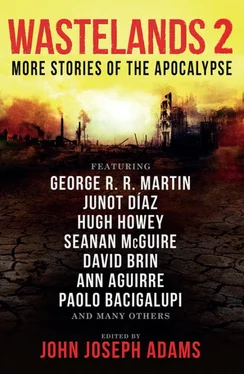“It’s on the backup. Has been for almost two hundred years. The Crash took out their electrical source, and it’s been running on the Tower’s solar array ever since.”
“Why do you come down here every day?”
“Check the gauges. Look around. Make sure everything’s okay.”
That shook me. “What do you do if it isn’t?”
“Flip a circuit breaker. Tighten a connection. Rewire whatever.” She inhaled. “Somebody has to do this.”
“Jesus.”
“They kept this place manned for forty years. Then, after the Crash, the son of one of the people responsible for the original decision, Avery Bolton, the guy the Tower’s named for, stayed on. And kept the place going. When he died, his daughter succeeded him. And brought her family. In one way or another, that family has been here ever since. Until Corey. And his brothers. His brothers weren’t worth much, and now I’m all that’s left.” She shook her head. “Seen enough?”
* * *
“Ellie, do you really believe all this?”
“I believe there’s a good chance the threat is real.” We were sitting in the lobby. “Why else would I be here?”
“Things get twisted over a long time. Maybe they were wrong.” Outside, the day was bright and cold. “I just can’t believe it.”
“That’s good,” she said. “You should continue to think that. But I’m going to have to continue to assume that Corey knew what he was talking about.”
“My God, Ellie, it’s a trap .”
She looked at me, and her eyes were wet. “Don’t you think I know that?”
I looked up at an oil of a Sioux warrior on horseback, about to plunge a lance into a bison. “There’s a way to settle it,” I said.
She shook her head. “No.”
“Ellie. We can shut it down. Nothing will happen.”
“ No . I won’t consider it. And I want you to promise you won’t do anything like that.”
I hesitated.
“I want your word, Jeff. Please .”
“Okay,” I said.
“Not ever. No matter what.”
“Not ever.” She looked fragile. Frightened. “No matter what.”
She looked out across the snowfields. “It must be time to go.”
“I won’t leave you,” I said.
* * *
That evening was a night to kill for. The consummation of love, denied over a lifetime, may be as close as you can come to the point of existence. I took her, and took her again, and went limp in her arms, and woke to more passion. Eventually the curtains got gray, and I made promises that she said she didn’t want to hear, but I made them anyway. We had a magnificent breakfast, and made love again in the room with the fireplaces. Eventually, sometime around lunch, we went down and looked again at Bolton’s devil. She took along a checklist, and explained the gauges and circuit breakers and pointed out where the critical wiring was, and where things might go wrong. Where they’d gone wrong in the past. “Just in case,” she said. “Not that I expect you to get involved in this, but it’s best if someone else knows. Edward hated to do this. He rarely came here.”
She showed me where the alarms were throughout our living quarters, and how, if the power supply got low, the system automatically shunted everything into the storage batteries in the lab. “It’s happened a couple of times when we’ve had consecutive weeks without sunlight.”
“It must get cold,” I said. The temperatures here dropped sometimes to forty below for a month at a time.
“We’ve got fireplaces,” she said. “And we’ll have each other.”
It was all I needed to hear.
I stayed on, of course. And I did it with no regrets. I too came to feel the power of the thing in the lab. I accepted the burden voluntarily. And not without a sense of purpose, which, I knew, would ultimately bind us together more firmly than any mere vow could have.
We worried because the systems that maintained the magnetic bottle were ageing. Eventually, we knew, it would fail. But not, we hoped, in our lifetimes.
We took turns riding the buckboard over to Sandywater for supplies. Our rule was that someone was always available at the Tower. In case.
And one day, about three months after my arrival, she did not come back. When a second day had passed without word, I went after her. I tracked her as far as the town, where I found the buckboard. There was no sign of her. Jess Harper, who works for Overland, thought he’d seen her get into a buckboard with a tall bearded man. “They rode west,” he said. “I thought it was odd.”
That was almost a year ago. I still make the rounds in the Tower, and I still believe she’ll come back. In the meantime, I check the gauges and occasionally throw a circuit breaker. The power in the living quarters shut down once, but I got through it okay. We got through it okay.
What I can’t understand is how I could have been so wrong. I know who the bearded man was, and I try to tell myself that they must have been very desperate to get away. And I try to forgive them. Forgive her .
But it’s not easy. Some nights when the moon is up, and the wind howls around the Tower, I wonder what they are doing, and whether she ever thinks about me. And occasionally, I am tempted to break my promise, and turn things off. Find out once and for all.
I don’t remember how the sun feels.
It’s an abstract concept for me, something I know exists, but doesn’t have the meaning it once did. When we first came down, my mom and dad said it was just for a few weeks, just a precaution. The outbreaks in the city came from some biological agent released in Times Square, I guess, and the news was full of conflicting reports on whether it came from North Korea or Iran. Other sites had other theories, but it was a coordinated strike, targeting cities all over the world.
At the time, I didn’t know why—or even what—was happening. I was thirteen when my parents quietly bought a unit in the bunkers. By that point, the city was bad enough that my mother no longer went out to do the marketing. Instead, she called a service that brought our food, and she didn’t let the courier come into the apartment, either. He left our groceries in the foyer with the doorman, who then scanned to make sure there were no foreign objects in the boxes or suspicious contaminants present.
By this point, I had stopped attending school. I was nine when they declared a state of national emergency and the country went to martial law, trying to contain the damage. Whole sectors of the city were designated hazardous and quarantined accordingly. My dad said the heavily armed soldiers in the streets patrolled to protect me, so I wasn’t to worry about them. They would soon restore order and things would get back to normal. Though I didn’t know it at the time, he was totally wrong.
For us, normal ended on May 5 when the chemicals exploded in Times Square.
The world never recovered.
It’s funny, but when I look back over my childhood, I see a progression of my world getting smaller. At five, I went on a plane with my parents and the whole universe lay open before me. There was a white beach with sand soft as powder and an endless blue ocean; the air was balmy, and it was an island, covered in mountains. I remember asking if this was heaven, and my mother laughed. She said, “It’s not heaven, Robin, but it is paradise.”
There were other wonders on that trip, but I was so young that they’ve begun to fade, colors running together like a painting left out in the rain. I mind this fiercely because it feels like time is stealing what little I have left. After we came home, I went to school, and my world was my teacher and twenty-four other students. Then it narrowed further to my parents and the walls of the apartment with the occasional supervised trip outdoors.
Читать дальше












